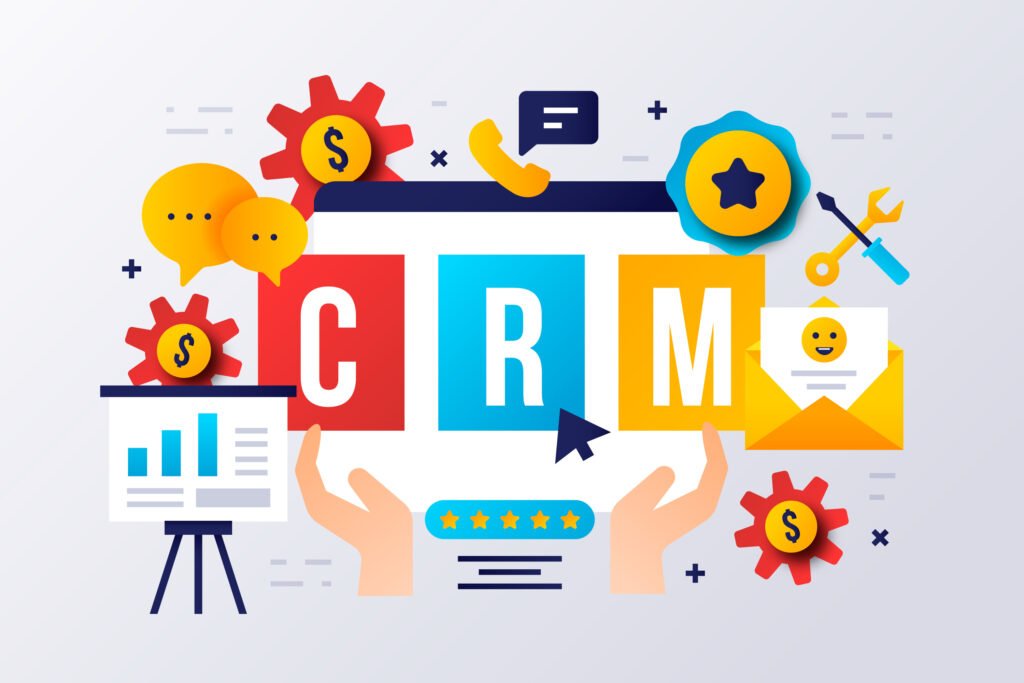In today’s digital marketing landscape, fostering genuine connections with your audience is paramount. While email marketing remains a powerful tool for reaching customers, its effectiveness hinges on personalization and relevance. This is where integrating Customer Relationship Management (CRM) systems with your email marketing strategy comes into play. By uniting these two forces, you gain a deeper understanding of your audience, enabling you to craft targeted email campaigns that resonate and drive engagement. Let’s delve into the magic behind integrating email marketing with CRM systems and explore the multitude of benefits it offers.
Unifying Your Data: The Power of a Centralized Hub
Imagine a scenario where your marketing and sales teams operate from separate universes. Marketing blasts out generic emails to a vast, unsegmented list, while sales struggle to identify qualified leads. This disconnect can be detrimental to your outreach efforts.
Integrating email marketing with CRM systems eliminates these silos. Your CRM acts as a centralized repository, housing valuable customer data such as demographics, purchase history, website behavior, and past interactions. This data becomes the bedrock of your email marketing strategy.
Segmentation: Tailoring Your Message to Specific Audiences
One of the most significant advantages of integrating email marketing with CRM systems is the ability to segment your audience. Gone are the days of mass emailing—you can now create targeted campaigns that speak directly to specific customer segments.
By leveraging CRM data, you can segment your audience based on various criteria, such as:
- Demographics: Age, gender, location
- Interests: Past purchases, website browsing behavior
- Engagement: Open rates, click-through rates from previous campaigns
- Lifecycle Stage: Leads, existing customers, churned customers
These segments allow you to craft highly personalized emails that resonate with each group’s unique needs and preferences. Imagine sending discount offers for products a customer has previously viewed or educational content addressing their pain points. This level of personalization fosters stronger connections and boosts engagement.
Personalization: The Art of Creating One-to-One Interactions
Personalization is the art of transforming email marketing from a broadcast channel to a personalized conversation. When you integrate email marketing with CRM systems, you gain access to a wealth of customer data that can be used to personalize your emails in several ways:
- Addressing customers by name
- Recommending products based on purchase history
- Tailoring email content to specific lifecycle stages
- Highlighting past interactions or abandoned carts
These personalized touches create a sense of recognition and value for your customers. They feel like you understand their needs, leading to increased trust and brand loyalty.
Triggered Emails: Automating Engagement at Every Touchpoint
Beyond segmentation and personalization, integrating email marketing with CRM systems unlocks the power of automation. You can set up triggered emails that are sent automatically based on specific customer actions or behaviors.
Here are some examples of triggered emails you can create:
- Welcome emails for new subscribers
- Birthday or anniversary greetings
- Abandoned cart reminders
- Re-engagement campaigns for inactive customers
- Transactional emails with order confirmations or shipping updates
Triggered emails capitalize on specific moments in the customer journey, fostering engagement and driving conversions. They nurture leads, win back dormant customers, and keep your brand top-of-mind.
Measurable Results: Tracking Performance and Optimizing Campaigns
A crucial aspect of any marketing strategy is measuring success. When you integrate email marketing with CRM systems, you gain access to comprehensive campaign performance data. You can track key metrics such as:
- Open rates
- Click-through rates
- Conversion rates
- Unsubscribe rates
By analyzing this data, you can identify what’s working and what needs improvement. You can A/B test different subject lines, email content, and CTAs to optimize your campaigns for better performance.
Furthermore, integrating your CRM with your email marketing platform allows you to track the impact of your email campaigns on sales pipeline growth and revenue generation. This closed-loop reporting provides valuable insights for optimizing your overall marketing strategy.
Streamlined Workflows: Boosting Efficiency and Collaboration
The integration of email marketing with CRM systems not only enhances customer engagement but also streamlines workflows for your marketing and sales teams. Here’s how:
- Eliminates manual data entry: CRM data automatically populates your email marketing platform, saving time and minimizing errors.
- Improved collaboration: Sales and marketing teams have access to the same customer data, fostering better alignment and communication.
- Automated follow-ups: CRM systems can trigger automated email follow-ups based on sales interactions, ensuring no lead falls through the cracks.
Conclusion
In today’s competitive marketing landscape, integrating email marketing with CRM systems is no longer a luxury, but a necessity. By harnessing the power of this integration, you can create a seamless customer experience, boost sales, and achieve your marketing goals. So, break down the data silos and unlock the synergy between these powerful tools to watch your customer relationships and business flourish.
Ready to Take Your Customer Engagement to the Next Level?
Integrate your email marketing with a powerful CRM system today!
ConvertKit is a user-friendly email marketing platform that seamlessly integrates with popular CRM solutions. With ConvertKit, you can easily segment your audience, personalize campaigns, and automate workflows, all while gaining valuable customer insights.


